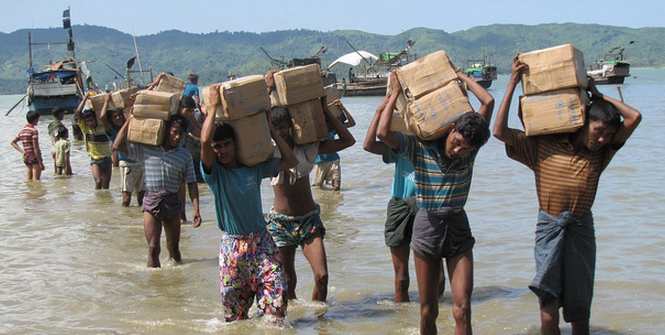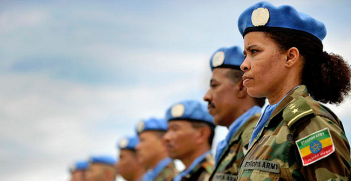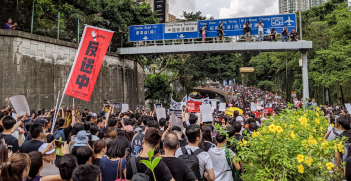The Muslim “Rohingya” and Myanmar’s Upcoming Election

Myanmar goes to the polls on November 8 after five years of significant reform, yet these elections pose a great danger for the “Rohingya”. Why? Who are they, why can’t they vote and what will it mean for them? And how could this be, given Nobel peace-prize laureate Aung San Suu Kyi’s National League for Democracy (NLD) are favoured to win a majority of contested seats and possibly be in a position to name the next president?
Rakhine State in western Myanmar is home to an estimated 800,000-1,000,000 Muslims, most of whom self-identify as “Rohingya”, but whom the Burmese call “Bengali”. Almost all are denied citizenship, rendering them effectively stateless and thus marginalised and vulnerable. This is despite the fact that they, their parents and grandparents, were almost all born in what is now Myanmar.
The “Rohingya” have been in the international spotlight this year, as refugees in boats around Thailand and Malaysia. The exodus over several decades has been huge, particularly after communities were burned in communal violence in 2012. Some 25,000 have taken to boats during 2015 alone, according to the UN refugee agency (UNHCR), as their lives have been made increasingly fragile by the spread of ethnoreligious nationalism under relaxed freedom of speech. The UNHCR also care for 140,000 in internal displacement camps (IDP) in Rakhine, plus almost 47,000 as refugees in Malaysia and 33,000 in Bangladesh. Another estimated 300,000 live in Bangladesh illegally after fleeing Myanmar.
“Rohingya” were allowed to vote in the 2010 election, despite being effectively residents rather than full citizens. Two political parties fielded over 30 “Rohingya” candidates, and several won seats with the ruling Union Solidarity and Development Party. For 2015, however, anyone not recognised as a full citizen has been removed from the electoral role, meaning approximately 500,000 lost voting rights. U Kyaw Min, former schoolteacher and president of the Democracy and Human Rights Party (a “Rohingya” party), says the number of voters in the predominantly Muslim district of Buthidaung has fallen from more than 150,000 in 2010, to just 27,000 – and 15 of 18 candidates are barred from running. Thus, Muslim-majority constituencies in northern Rakhine could be won by candidates that want to see the “Bengalis” expelled from the country, or worse. The limited political voice this vulnerable group have could be silenced. Unfortunately, Suu Kyi and the NLD have not helped: they remain silent on the issue and refuse to select even a single Muslim amongst their 1,000+ candidates, despite 4 percent of the national population being Muslim. Even in the best-case scenario, where someone from the NLD won the presidency, no drastic policy change towards the “Rohingyas” should be expected.
For most outside the country, none of this makes much sense. These deep-seated passions are based in long historical narratives which would take too long to fully unpack. The “Rohingya” claim to be a Muslim ethnic minority national race with a centuries-long heritage in the country. Most of the 89 percent Buddhist majority believe they are illegal arrivals from Bangladesh, many since Independence. Both claims are dubious historically.
While pre-colonial Rakhine rulers were Buddhist, their subjects included Muslims. Both communities existed harmoniously until the 1784 Burmese conquest and persecution of Muslim minorities. The subsequent massive exodus of refugees to Chittagong was a key justification for the British annexation of Rakhine in 1826, ostensibly to protect the minorities from predatory Burman expansionism. But the British severely mismanaged the competing interests of the Buddhists and Muslims, promoting a massive wave of Bengali migration that deprived Rakhine of inherited land, recruiting Muslims into civil service ahead of Burmese and Rakhine and arming them during WWII as a last line of defence. Muslims grew to almost half the population by the end of the colonial era, and to this day Buddhists remain fearful that they are being overrun by Bengali migration. Massacres on both sides resulted in almost total segregation of Muslims to the north and Buddhists to the south. After Independence in 1948, Rakhine Buddhists fought for a separate homeland while competing Muslim “Mujahid” armed separatists adopted the name “Rohingya”.
The name “Rohingya” has thus become a political, not ethnic term, synonymous with perceived jihadist threat, and provokes concerns of a claim for a semi-autonomous or independent state. While the armed separatist movements were crushed during the 1950-60s, resentment, fears and unresolved citizenship issues were merely suppressed by authoritarian rule and remain unresolved.
The violence that erupted in 2012 appears integrally connected with the military government’s decision to grant voting rights to the “Rohingya/Bengali” population for the 2010 election. That decision appears to have been motivated more by a desire by the ruling party to limit the vote for the local Rakhine Buddhist nationalist party rather than to give rights and citizenship to these people, but it was seen by most Rakhine as a major step towards full citizenship. What has happened since 2012 is, in large part, a result of the push back by Rakhine Buddhists, and their success in promoting a shared Buddhist nationalism between the Rakhine and Burmese.
This is, therefore, in many ways a 3-way power struggle between the Burmese, the Rakhine Buddhists and the Muslim “Rohingya”. All three feel they are threatened minorities struggling for their very survival: the Burmese from the potential flood of Muslims who might come in the “Western Gate” from overpopulated Bangladesh; the Rakhine from both potentially jihadist Muslims and the dominant Burmese; and the “Rohingya” from both Rakhine and Burmese Buddhists who deny them citizenship and perpetuate or turn a blind eye to human rights abuses.
In a context where all groups react out of intense existential fear and feelings of being under siege and struggling for their very survival, even commencing conversations about renegotiating citizenship and constructive relationships is highly provocative. Yet until these very real fears are dealt with, hundreds of thousands of people will continue to suffer. Meanwhile, the Rakhine Nationalist Party is poised to win the vast majority of both state and national seats in the 2015 election, consolidating its position and further silencing and marginalising Muslims, pushing them into deeper vulnerability.
Dr Anthony Ware is the Acting Director or Australia Myanmar Institute and Senior Lecturer in International Development at Deakin University. This article can be republished with attribution under a Creative Commons Licence.





